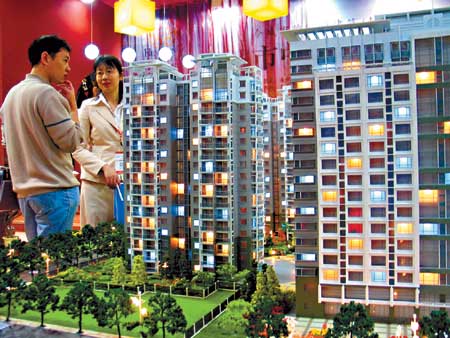China's fast growing fixed asset investment, which contributed to the
country's economic growth of 10.2 per cent year-on-year during the first quarter
of this year, may create some obstacles.
The National Bureau of Statistics said yesterday that
China's fixed asset investment rose 27.7 per cent during the first
quarter.

A visitor looks at
a miniature of a real estate project at a housing fair in Nanjing, capital
of East China's Jiangsu Province yesterday.
[newsphoto] |
The growth rate was 4.9 percentage points higher than the same period last
year. It also exceeded the government's target growth of 18 per cent for 2006.
Niu Li, a senior economist with the State Information Centre, said the first
quarter fixed asset investment grew too fast.
"This will put new pressures on sectors such as coal, electricity, oil and
transportation," he said.
Zheng Jingping, spokesman for the National Bureau of Statistics, said fast
growth of fixed asset investment was one of a few prominent problems that called
for the government's "attention."
"This situation (fast fixed asset investment growth) is closely related to
fast credit growth," Zheng said.
Earlier figures from the People's Bank of China, the central bank, show that
new loans totalled 1.26 trillion yuan (US$157.5 billion) in the first quarter,
70 per cent more than the same period last year.
The new loans account for half of the bank's 2.5 trillion yuan (US$312
billion) loan growth target for this year.
The broad money supply, or the M2, rose 18.8 per cent year-on-year at the end
of March, topping the central bank's official target for 10 months.
"The scale of credit growth is a bit fast," Zheng said. "This problem has
already attracted the attention of the State Council and the People's Bank of
China."
Fast growth in credit and money supply will have an impact on China's
economic performance, Zheng said. "Although it will boost economic growth in the
initial stage, it will lead to inflationary pressure and structural problems."
Zheng pointed out there are some loans in some commercial bank branches
where, in the course of making loans, the banks believe the assurances of local
governments.
There are also some projects where private investors make appearances, but
behind the scenes there are indirect government guarantees, he said. "The
mechanism is not rational enough."
"Because credit growth has been quite fast, we must pay attention to suitable
controls on the investment from the credit, and in particular strengthen
guidance to commercial banks," he said.
Economist Niu said the government should take monetary measures to curb too
fast investment growth.
"The People's Bank of China could raise the percentage of deposits banks must
set aside as reserves to stem money supply growth that's encouraging lending for
investment projects," he said. It could also impose more administrative controls
on lending.
(China Daily 04/21/2006 page9)
(For more biz stories, please visit Industry Updates)